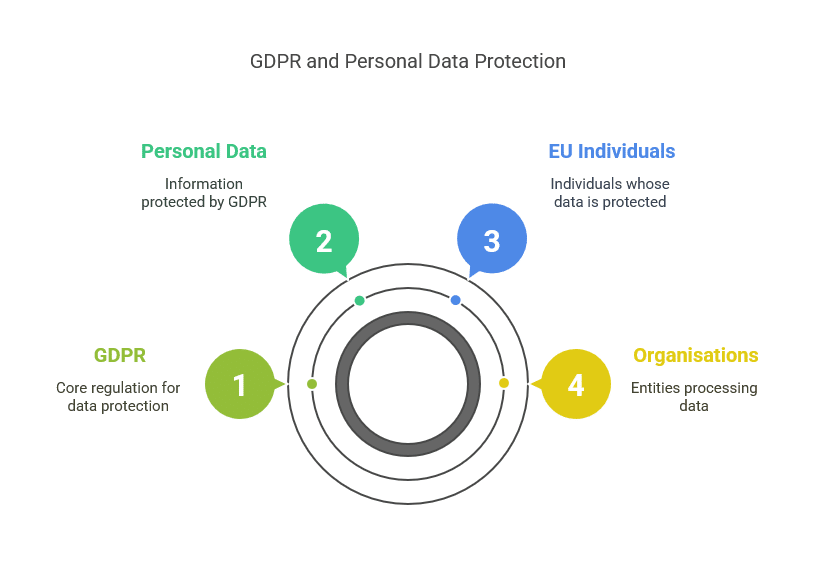Introduction
The General Data Protection Regulation (GDPR) has reshaped how organisations handle personal data across Europe, and in the UK, its principles continue to apply under the UK GDPR and the Data Protection Act 2018. With data breaches, cyberattacks, and privacy concerns making headlines almost daily, GDPR training has become a critical priority for businesses of all sizes.
For UK companies, GDPR training is not merely a formality — it is a legal safeguard. It ensures that employees understand their responsibilities, prevents costly mistakes, and builds public trust. For professionals, it is an opportunity to develop sought-after compliance skills, enhance career prospects, and avoid the pitfalls of ignorance when working with sensitive information.
Understanding GDPR and Its Core Principles
At its heart, the GDPR is about protecting individuals’ personal data and giving them greater control over how it is collected, processed, and stored. Under the UK GDPR, these protections are enshrined in law, and failure to comply can result in severe fines from the Information Commissioner’s Office (ICO).
The regulation is built around seven core principles: lawfulness, fairness, and transparency; purpose limitation; data minimisation; accuracy; storage limitation; integrity and confidentiality; and accountability. A comprehensive GDPR training programme will ensure that all employees not only know these principles but can apply them in practical, day-to-day situations.
Why GDPR Training Matters for Organisations
For organisations, GDPR compliance is not optional — it is a legal requirement. Without adequate training, staff may unknowingly breach regulations, leading to penalties that can reach millions of pounds. The ICO has issued fines to businesses ranging from global corporations to small local firms for failing to protect personal data properly.
Beyond avoiding penalties, GDPR training improves operational efficiency. Employees who understand the law are better equipped to handle personal data responsibly, reducing the risk of breaches. It also reassures clients and customers that their information is in safe hands, strengthening the company’s reputation in an increasingly privacy-conscious marketplace.
Types of GDPR Training Available

There are many ways to deliver GDPR training, and the best choice depends on your organisation’s needs and resources. In-person workshops offer the benefit of interactive learning, with opportunities to ask questions and participate in group exercises. They are particularly effective for high-risk departments, such as HR or IT, where hands-on case studies can be explored.
Online GDPR training courses, on the other hand, are flexible and accessible from anywhere. These can be completed at an employee’s own pace, making them ideal for large, geographically dispersed teams. Some providers also offer hybrid models, combining virtual modules with live sessions to create a balanced learning experience.
What a Good GDPR Training Programme Should Cover
A robust GDPR training course goes far beyond simply explaining the law. It should start with the basics — defining personal data, explaining individual rights, and outlining an organisation’s legal obligations. From there, it should address how to process data lawfully, obtain valid consent, and respond to subject access requests effectively.
Practical training is essential. This can include simulated data breach exercises, step-by-step guidance on handling data securely, and real-world examples of compliance failures and their consequences. The aim is to give employees not only the knowledge but the confidence to make compliant decisions in their daily roles.
How to Choose the Right GDPR Training for Your Needs
Selecting the right GDPR training provider involves assessing your organisation’s specific requirements. Consider the nature of your business, the type of personal data you handle, and the number of employees who require training. A tech company dealing with sensitive customer information will have different needs from a small retail shop.
Before committing, review the provider’s course outline, trainer qualifications, and whether the training includes updates on recent legal developments. Accreditation, such as Continuing Professional Development (CPD) approval, can also add credibility. Ultimately, the goal is to choose a programme that is engaging, relevant, and adaptable to your operations.
Legal and Financial Benefits of GDPR Training
While GDPR training requires an investment of time and money, the returns are substantial. Proper training reduces the risk of breaches that can trigger significant ICO fines and compensation claims from affected individuals. In some industries, demonstrating compliance can also be a competitive advantage when tendering for contracts.
From a financial standpoint, the cost of GDPR training is minimal compared to the expense of reputational damage, lost customers, and legal proceedings following a breach. In fact, many businesses view training as an insurance policy — one that safeguards both their operations and their public image.
Best Practices for Ongoing GDPR Compliance
GDPR compliance is not a one-time task. Laws evolve, and so do the threats to data security. To stay compliant, organisations should provide regular refresher courses, ensuring employees remain up to date with the latest developments and best practices.
Embedding GDPR awareness into company culture is equally important. From new-starter inductions to routine team meetings, data protection should be treated as a shared responsibility. Internal audits, risk assessments, and clear reporting channels for suspected breaches will help reinforce compliance throughout the business.
Conclusion
In the modern digital economy, personal data is one of the most valuable — and vulnerable — assets a business can hold. GDPR training equips employees with the knowledge and skills to protect that data, comply with the law, and build customer trust.
Whether you are a sole trader, an SME, or a multinational corporation, investing in quality training is not just a regulatory necessity — it is a commitment to integrity, transparency, and long-term success. With the right training in place, compliance becomes second nature, and your organisation can operate with confidence in a privacy-focused world.
FAQs
What is GDPR training and who needs it?
GDPR training educates individuals and organisations on the rules and best practices for handling personal data under UK GDPR. Anyone who processes personal data as part of their role should complete it.
How often should GDPR training be completed?
Training should be refreshed at least annually, or more frequently if there are significant legal changes or organisational updates.
Is GDPR training mandatory for all UK businesses?
While the law does not explicitly require training, the UK GDPR obliges organisations to ensure staff understand their data protection responsibilities — training is the most effective way to achieve this.
How long does GDPR training take?
Online courses may take one to two hours, while in-depth workshops can span a full day. The duration depends on the depth of the material and the learner’s role.
Can GDPR training be done online?
Yes. Many providers offer online courses that are accessible anywhere and can be completed at the learner’s own pace, making them ideal for remote teams.
You may also read: Subject Access Request: A Complete Guide for UK Individuals and Organisations

